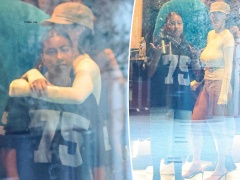
LonDON (AP) — Prince Harry lost a preliminary round Friday in his libel case against against the publisher of the Daily Mail tabloid over an article that said he tried to hide his efforts to retain publicly funded protection in the UK after giving up his status as a working member of the royal family.
A London judge said the Duke of Sussex failed to knock out Associated Newspaper Ltd.’s defense that its article reflected an honest opinion. A hearing is scheduled Tuesday to discuss the consequences of the ruling.
Justice Matthew Nicklin said in that ruling that “it is not fanciful that the Defendant will be successful, at trial.” He scheduled a hearing Tuesday in the High Court to discuss the consequences of the ruling.
The ruling comes just a day after another judge concluded three days of arguments — mostly behind closed doors — over whether the government unfairly stripped Harry of his security detail after he and his family moved to the US in 2020.


Harry, 39, the younger son of King Charles III, is challenging the government’s decision to provide security to him on a case-by-case basis when he visits Britain. Harry has said hostility toward him and his wife, Meghan Markle, on social media and relentless news media hounding threatens their safety.
More must-see royals coverage:
- How Prince Harry and Meghan Markle met
- Prince William and Kate Middleton’s relationship timeline
- Royal family tree and line of succession
The Mail on Sunday and Mail online published an article in February 2022 about the issue headlined: “How Prince Harry tried to keep his legal fight with the government over police bodyguards a secret … then — just minutes after the story broke — his PR machine tried to put a positive spin on the dispute.”
Harry claims the article was “fundamentally inaccurate” and the newspaper libeled him when it suggested he lied in his initial public statements about his case challenging the government.

Associated Newspapers argued the article expressed an “honest opinion” and did not seriously harm Harry’s reputation.
Nicklin previously ruled the article was defamatory but had not considered whether the story was accurate or in the public interest.
The government, meanwhile, has defended its decision to withdraw full protection for Harry because he stepped down from his role as a senior working member of the family. It said he was treated fairly and provided with security occasionally when he visits.

Another judge earlier this year shot down Harry’s request to privately reimburse London’s police force to guard him when he comes to town. A government lawyer had argued officers shouldn’t be used as “private bodyguards for the wealthy.”
The dispute with the Mail is one of four lawsuits Harry has pending against publishers of British tabloids in his ongoing battle with the press.
His three other cases allege that journalists at the Mail, the Daily Mirror and the Sun used unlawful means, such as deception, phone hacking or hiring private investigators, to try to dig up dirt about him.






